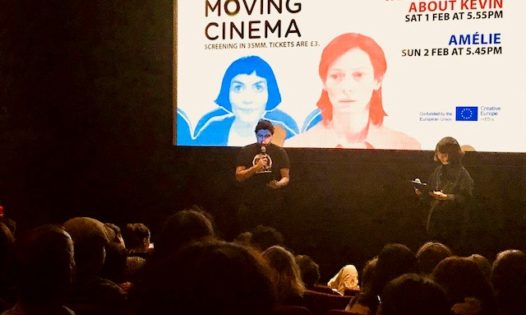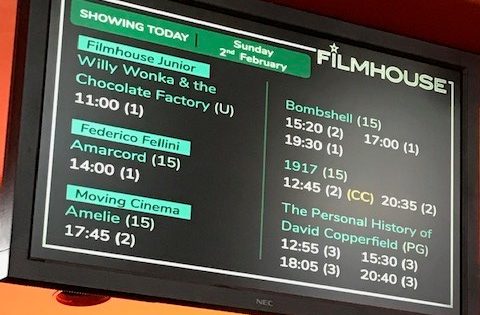MOVING CINEMA at FILMHOUSE EDINBURGH
SUNDAY 2 FEBRUARY 2020
Amelie, chosen by our Young Programmers and introduced by Ricardo and Xuanlin.
On Sunday, we were delighted to introduce Amelie to a sold out crowd in Cinema 2 at Filmhouse, Edinburgh’s leading independent cinema. We had worked of months with our fellow Young Programmers to watch and discuss films, before selecting two to show over Brexit weekend.
The project is important to us- allowing us to show our support for European film at this difficult time. We chose Amelie for its witty and stylish direction and for its bright, positive message. It was also in strong contrast to our other Moving Cinema selection – Lynne Ramsay’s We Need to Talk About Kevin – equally stylish but bitterly dark – which played on Saturday 1st February
Here is our introduction…
R: Hello everyone, and welcome to Filmhouse. My name is Ric and this is Xuanlin. We are
Young Programmers for Filmhouse and the Edinburgh International Film Festival. For the last
six months we have been involved in a European project called Moving Cinema, designed to
connect young audiences with the very best in European film. We have selected some of the
best to screen here at Filmhouse.
X: Today’s film is Jean-Pierre Jeunet’s Amélie, which was released in 2001 to French and
international acclaim – and continues to hold audiences under its warm, whimsical spell even 19
years later.
R: Amélie, a complete U-turn from Jeunet’s previous alien outing Alien Resurrection, was
nominated for five Academy Awards but controversially shut out of the Cannes Film Festival. It
was described by the Cannes Film Festival selector as “uninteresting” – but most likely this was
due to the fact that the version submitted for selection was an early cut without music. Many
would agree that the film’s iconic original score, by Yann Tiersen, is an integral part of the film –
a key element of its magical atmosphere.
X: Set in Montmartre, Paris, Amélie follows its titular character along her quest to change the
lives of the people around her for the better – one small intervention at a time. Its community of
eccentric yet endearing cast of characters remind us of the value of kindness and empathy in
our often hostile political environment. This weekend, as you know, is Brexit weekend – maybe
there is no better film than Amélie to remind us of the things we should care about as we face
increasing social division.
R: Some fun facts about Amélie:
– R: Jean-Pierre Jeunet originally wrote the film and its main character for Emily Watson,
the English actress – however, due to her own scheduling conflicts and the fact that she
couldn’t really speak (or act) in French, Jeunet rewrote the screenplay for a French
actress. He called Audrey Tautou to audition after seeing her on a poster for Venus
Beauty Institute; she was the first actor to audition and Jeunet found her perfect for the
role.
– X: Another fun fact: in 2000, the year before the movie came out, there were 12 babies
in England and Wales given the name Amélie . The number shot up to 250 in 2002, and
by 2007, there were around 1,100 new Amélies per year.
– R: Jeunet used a real cafe , really called Café des Deux Moulins, for Amélie’s workplace
and the center of much of the film’s action. Next time you’re in Paris, you’ll find it looking
approximately like it does in the movie, except that now the crème brûlée is named after
Amélie, and tourists are always taking pictures of the place. (All its Yelp reviews mention
the film.)
R: Slightly less fun but pretty important fact: Amélie was heavily criticized upon release for its
erasure of Montmartre’s ethnic diversity – all its major characters are white. When shooting on
location, the director and the crew would also scrub the area of trash and graffiti in order to
create the magical realist world of the film. It’s worth considering if this was necessary. As
Young Programmers, we believe that inclusive casting and putting the real Montmartre on
screen would not have detracted from Amélie’s charms.
X: We feel that Amélie owes its lasting appeal to its celebration of the joyous idiosyncracies of
life. It reminds us that every one of us is unique with our own eccentricities, the things that we
dislike or are afraid to let go of, our own stories and perhaps tremulous hopes for the future.
Amélie has often been referred to as “the cinematic equivalent of a hug”, and we hope you feel
that today.
Enjoy the film!



